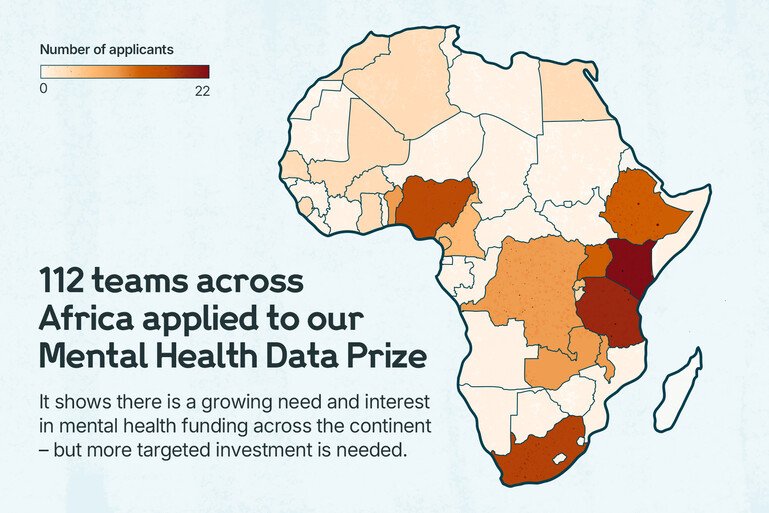
How we redesigned our Mental Health Data Prize for scientists in Africa
Our first Mental Health Data Prize didn’t receive as many applications from South African scientists as we hoped. Here's how we took action and redesigned the prize with and for research communities across Africa.

Ellice Weaver / Wellcome
How can we use existing data to better understand and treat anxiety, depression and psychosis?
This is the challenge we set data scientists who take part in our Mental Health Data Prize.
Our first prize, which we launched in 2022 along with our partners Social Finance, was open to teams in the UK and South Africa. We engaged with mental health researchers, data holders and young people with lived experience to shape the prize.
The excitement and interest generated before the launch suggested we had designed something that works for the community.
But we didn’t receive as many applications from South Africa as we’d hoped.
We had a hunch that this was due to how we had structured and designed the prize. So, we ran an evaluation, workshops and expert consultations to redesign the prize to meet the needs of researchers and data scientists in Africa.
Here’s what we found.
How we tailored the prize to researchers in Africa
It is estimated that more than 116 million people in Africa are affected by mental health conditions. Despite the scale of this challenge, access to adequate care remains extremely limited. We believe that data and data-driven technologies hold transformative potential for advancing mental health research in this context.
Emerging insights from diverse data sources can help us better understand how mental health conditions develop, as well as how individuals respond to interventions over time. Modern analytical methods can also support more accurate diagnosis and improved management strategies when applied to large-scale datasets.
Realising this potential, however, requires sustained and targeted research investment. Funding disparities, geographical inequities and societal stigma are factors that have contributed to a lack of investment in mental health research in Africa. Our data prize seeks to address.
Our evaluation revealed several areas for improvement to make the prize more impactful and accessible. Some of the changes we made were:
- providing more upfront support in data capacity building and forming a team with the necessary data and digital skills to participate
- shifting away from a South African-specific focus to leverage datasets from across the continent and foster wider regional collaboration
- extending timelines and simplifying the structure of the prize
- expanding the scope of the prize to include research into psychosis
In addition to implementing these changes, we partnered with the African Population and Health Research Center (APHRC) to run the prize. A pan-African organisation, the APHRC has deep regional knowledge and a strong track record for driving data-informed policy and decision-making. They provided support on team formation and data capacity building. They also ran training courses and webinars covering key topics such as mental health, data science, grant writing and how to involve lived experience expertise in research.
The result of our foundational work was a huge success.
Our Africa Mental Health Data Prize, which launched in 2024, received 112 applications from 27 countries across the continent. Ten winning teams have been awarded £200,000 each to develop their projects in 2025 to 2026.

112 applicants from across 27 countries in Africa applied to our Mental Health Data Prize.
Wellcome
| Kenya | 22 |
| Ethiopia | 15 |
| Uganda | 15 |
| Tanzania | 11 |
| South Africa | 10 |
| Nigeria | 8 |
| Cameroon | 4 |
| Rwanda | 4 |
| Benin | 2 |
| Congo | 2 |
| Multiple countries | 2 |
| Malawi | 2 |
| Zambia | 2 |
| Algeria | 1 |
| Burkina Faso | 1 |
| Burundi | 1 |
| Côte d'Ivoire | 1 |
| Egypt | 1 |
| Equatorial Guinea | 1 |
| Gambia | 1 |
| Ghana | 1 |
| Mali | 1 |
| Morocco | 1 |
| Mozambique | 1 |
| Senegal | 1 |
| Sierra Leone | 1 |
Historically, infectious diseases have been a priority for health research funding in Africa as the continent has a high burden of diseases. While there has been little investment in mental health research, the number of applications we received shows that there is a growing need in this space. The interest is there, and the momentum is real.
What did we learn?
This experience highlights that a one-size-fits-all approach isn’t appropriate for research funding, particularly in lower resource settings. Research funders need to take time designing funding schemes and ensure the target communities' priorities inform our work.
We are a global funder, so our approach to funding should reflect the local priorities and needs of communities around the world. This isn’t an easy task, but unless we put dedicated time and effort to it, the inequities within the research ecosystem will continue to widen. That’s why, as part of our equity commitment, we aim to advance inclusive practices that broaden the range of people leading, participating in and benefiting from science.
Leveraging the experience and expertise of the regional research organisations is a key step to doing this well. And, crucially, when things don’t go as expected, we must review our work, improve it and enhance its impact.
We’re funding research to help create transformative change in early intervention for anxiety, depression and psychosis.
There are currently no open funding opportunities for Mental Health. Learn more about the funding we provide.


